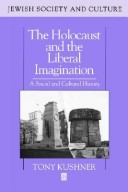Jewish Society & Culture S.
1 total work
This book attempts to explain, but not condemn, the responses and reactions of the democratic world to the attempted destruction of European Jewry. It concentrates on the impact of the Shoah on ordinary people in the democracies and examines the actions of the nation-state in the light of popular responses. The disciplines of social, cultural, gender and labour history are employed to add a different dimension to the existing literature. The book focuses particularly on Britain and the Shoah. Nonetheless, its approach is comparative, especially with regard to the United States of America, thus allowing consideration of mono-cultural and plurally defined liberal democratic societies. The book also adopts a secular chronology covering the 60-year period from the Nazi rise to power to the present day. Ultimately this study argues that the Shoah, both at the time and subsequently, is not simply German, Jewish or continental history, but is an integral part of the experience of many countries away from the killing fields. Consequently it aims to be as much a contribution to Anglo-American social and cultural history as it is an account of the Holocaust.
